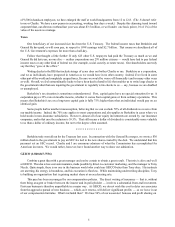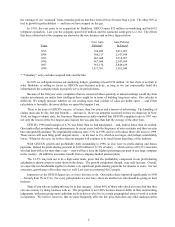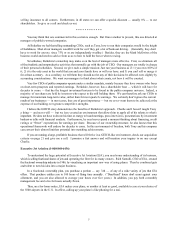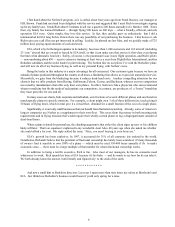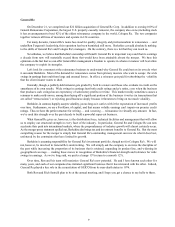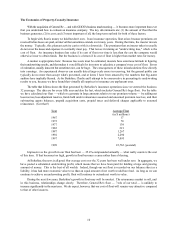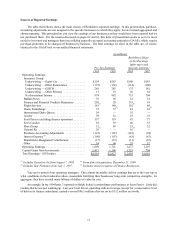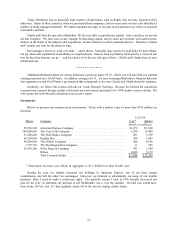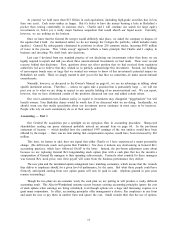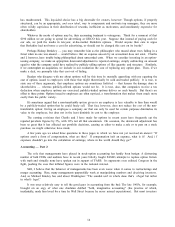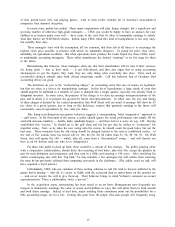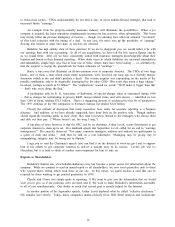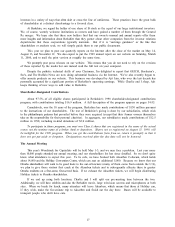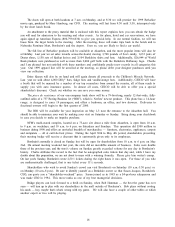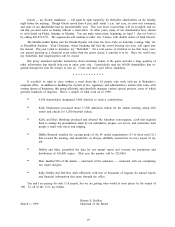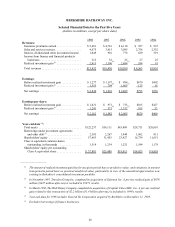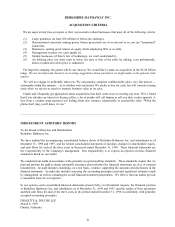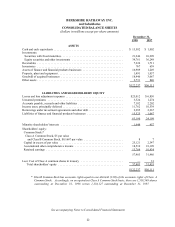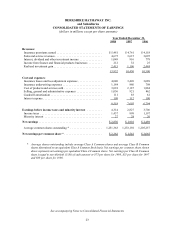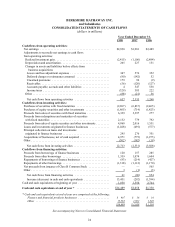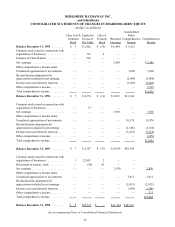Berkshire Hathaway 1998 Annual Report Download - page 16
Download and view the complete annual report
Please find page 16 of the 1998 Berkshire Hathaway annual report below. You can navigate through the pages in the report by either clicking on the pages listed below, or by using the keyword search tool below to find specific information within the annual report.15
of that period knew who was playing games. And, to their credit, virtually all of America’s most-admire d
companies then shunned deception.
In recent years, probity has eroded. Many major corporations still play things straight, but a significant and
growing number of otherwise high-grade managers — CEOs you would be happy to have as spouses for your
children or as trustees under your will — have come to the view that it’s okay to manipulate earnings to satisfy
what they believe are Wall Street’s desires. Indeed, many CEOs think this kind of manipulation is not only okay,
but actually their duty.
These managers start with the assumption, all too common, that their job at all times is to encourage the
highest stock price possible (a premise with which we adamantly disagree). To pump the price, they strive,
admirably, for operational excellence. But when operations don’t produce the result hoped for, these CEOs resort
to unadmirable accounting stratagems. These either manufacture the desired “earnings” or set the stage for them
in the future.
Rationalizing this behavior, these managers often say that their shareholders will be hurt if their currency
for doing deals — that is, their stock — is not fully-priced, and they also argue that in using accounting
shenanigans to get the figures they want, they are only doing what everybody else does. Once such an
everybody’s- doing-it attitude takes hold, ethical misgivings vanish. Call this behavior Son of Gresham: Bad
accounting drives out good.
The distortion du jour is the “restructuring charge,” an accounting entry that can, of course, be legitimate
but that too often is a device for manipulating earnings. In this bit of legerdemain, a large chunk of costs that
should properly be attributed to a number of years is dumped into a single quarter, typically one already fated to
disappoint investors. In some cases, the purpose of the charge is to clean up earnings misrepresentations of the
past, and in others it is to prepare the ground for future misrepresentations. In either case, the size and timing
of these charges is dictated by the cynical proposition that Wall Street will not mind if earnings fall short by $5
per share in a given quarter, just as long as this deficiency ensures that quarterly earnings in the future will
consistently exceed expectations by five cents per share.
This dump-everything-into-one-quarter behavior suggests a corresponding “bold, imaginative” approach to
— golf scores. In his first round of the season, a golfer should ignore his actual performance and simply fill his
card with atrocious numbers — double, triple, quadruple bogeys — and then turn in a score of, say, 140. Having
established this “reserve,” he should go to the golf shop and tell his pro that he wishes to “restructure” his
imperfect swing. Next, as he takes his new swing onto the course, he should count his good holes, but not the
bad ones. These remnants from his old swing should be charged instead to the reserve established earlier. At
the end of five rounds, then, his record will be 140, 80, 80, 80, 80 rather than 91, 94, 89, 94, 92. On Wall
Street, they will ignore the 140 — which, after all, came from a “discontinued” swing — and will classify our
hero as an 80 shooter (and one who never disappoints).
For those who prefer to cheat up front, there would be a variant of this strategy. The golfer, playing alone
with a cooperative caddy-auditor, should defer the recording of bad holes, take four 80s, accept the plaudits he
gets for such athleticism and consistency, and then turn in a fifth card carrying a 140 score. After rectifying his
earlier scorekeeping sins with this “big bath,” he may mumble a few apologies but will refrain from returning
the sums he has previously collected from comparing scorecards in the clubhouse. (The caddy, need we add, will
have acquired a loyal patron.)
Unfortunately, CEOs who use variations of these scoring schemes in real life tend to become addicted to the
games they’re playing — after all, it’ s easier to fiddle with the scorecard than to spend hours on the practice tee
— and never muster the will to give them up. Their behavior brings to mind Voltaire’s comment on sexua l
experimentation: “Once a philosopher, twice a pervert.”
In the acquisition arena, restructuring has been raised to an art form: Managements now frequently use
mergers to dishonestly rearrange the value of assets and liabilities in ways that will allow them to both smooth
and swell future earnings. Indeed, at deal time, major auditing firms sometimes point out the possibilities for a
little accounting magic (or for a lot). Getting this push from the pulpit, first-class people will frequently stoop


